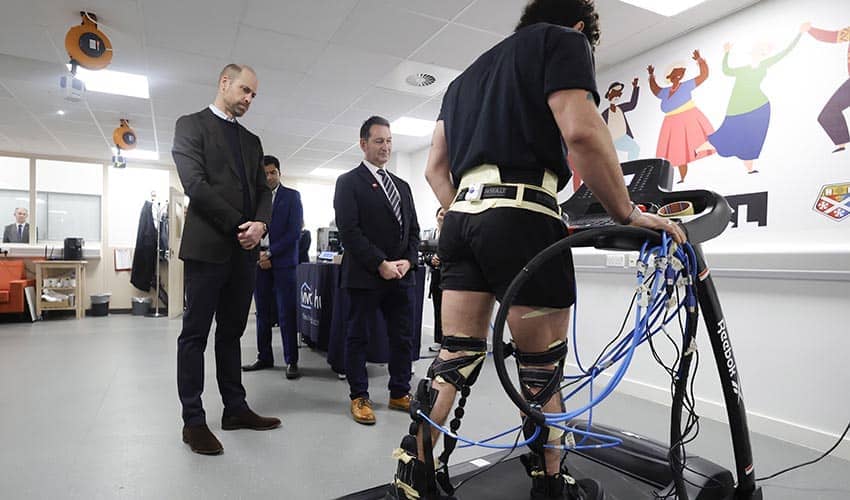Bristol’s screen industry experiences “boom-and-bust cycle” after post-pandemic recovery, new research from UWE Bristol finds

Bristol’s film and television industry went through a severe “boom-and-bust cycle” between 2022 - mid-2025, which has led to widespread redundancies and company closures, new research from the University of the West of England (UWE Bristol) has found.
A huge surge in productions following the ending of the COVID-19 restrictions led by streaming platforms such as Netflix was unsustainable, the research found, and the increase in production activity in 2022 was followed by an equally dramatic slump in 2023 and 2024.
The ‘Go West! 2.5 Bristol's Film and Television Industries’ report, written by Andrew Spicer, Professor of Cultural Production, and Jelena Krivosic, PhD research student from UWE Bristol’s Screen Research Group, is an update to the previous ‘Go West! 2.0’, published in 2022. Although usually published every five years, the decision to develop an interim report was based on the exceptional speed of change experienced by the sector, known for its volatility.
The report was launched at the Bristol Screen Summit this week, an annual event for industry professionals organised by UWE Bristol.
The “boom and bust cycle” identified in the report’s findings was reflective of the whole of the UK’s film and television sector.
Its other principal findings include:
- 53 companies from Bristol’s screen sector ceased trading.
- Natural History has experienced the most pronounced contraction: down from 17 companies and 44.2% of Bristol’s aggregate turnover in 2022, to 13 companies and 30% of the aggregate turnover in 2025.
- The sector experienced widespread issues of employment and wellbeing.
- There are less commissions, drawn from a narrower range, which are more risk averse. These are factors that threaten sustainability, growth and creative renewal in the screen industries.
- Mature infrastructure mitigation: the work of Bristol Film Office, Bristol UNESCO City of Film and The Bottle Yard Studios (Bristol City Council’s Film Services), training providers and regional R&D has all helped to offset these threats and helped sustain Bristol’s screen ecology.
Professor Andrew Spicer said: “The difficulties experienced by Bristol’s film and television sector reflects the wider national picture, but its Natural History specialism was particularly hard-hit. However, the report also shows the resilience of Bristol’s screen sector, the expertise and energies of its creative labour, and its continued attractiveness as one of the UK’s most important production centres.”
Despite the severe difficulties, the region’s film and television industries continue to be economically significant to the region with an aggregate turnover of £325m in 2025, an increase of £37m from the figure reported in 2022 – a rise of 11.38%.
The region’s competitive edge as a filming destination has contributed to sector resilience, as it has continued to attract strong levels of scripted film and High-End TV productions, for example Agatha Christie’s Seven Dials for Netflix, BBC comedy drama Boarders and BBC/Netflix young adult drama A Good Girl’s Guide to Murder. Although produced by London-headquartered companies, the fact that these productions use local infrastructure and employ local freelance crew has helped mitigate the turbulence experienced elsewhere by the industry. The region’s leading film and TV studio, The Bottle Yard Studios – now with its three additional sound stages at its state-of-the-art TBY2 facility – has maintained a strong booking slate including (in addition to the titles named above): Rivals (Disney+), Down Cemetery Road (Apple TV), The Forsytes (Channel 5) and feature film Bad Apples starring Saoirse Ronan.
The economic impact of production activity at The Bottle Yard Studios and Bristol Film Office-supported locations has increased year on year since the last report released in 2022. In 2024-25, the activity at The Bottle Yard Studios and Bristol Film Office was worth £46.6m to the city’s economy, an increase of 55% on the previous reporting period.
The report also found that despite its popularity amongst UK and international producers and filmmakers, the region has missed out on attracting certain production bookings due to the absence of a regional production fund. The West of England Combined Authority is now in the advanced stages of planning for a Regional Production Fund, designed to help increase provision for the region’s film and television industries, and provide an increased level of security for facilities like The Bottle Yard Studios and related supply chains.
West of England Mayor, Helen Godwin, who spoke at the Bristol Screen Summit, said: “Our screen sector is crucial for our region’s economy and for our identity – creating livelihoods and space for people to find purpose and tell our stories. Despite recent volatility, as set out in this report, Bristol’s film and TV industry has harnessed the fizzing creativity of a region that likes to do things its own way and has put us at the heart of this country’s creative sector.
“Next year will see the start of our £25 million Creative Places Growth Fund, devolved from government to invest in creative businesses and freelancers. The fund will invest to drive growth, innovation and global competitiveness, and will include the establishment of a new Regional Production Fund, which we will be shaping with the sector over the coming weeks and months.”
The labour pool was also identified as a far-reaching issue, formed by lack of security, anxiety and wellbeing issues, experienced by freelance labour in particular - a regional problem mirroring a national picture. The report recommends that a detailed study of the region’s freelance community be undertaken to fully understand the issues the sector’s freelancers face.
Related news

18 February 2026
Immersive theatrical reimagining of Moby Dick brings unique creative captioning to a live audience
An experimental theatre experience by UWE Bristol lecturer Sharon Clark and artist Jack Hardiker-Bresson uses creative captions for accessible storytelling.

23 January 2026
On-demand minibus services beneficial in rural areas but face financial challenges, trials suggest
Trials of ‘demand responsive transport’ minibus services boosted connectivity for people in rural and suburban areas, according to a new report produced by UWE Bristol researchers.

22 January 2026
Prince of Wales visits UWE Bristol to see pioneering robotic tech tackling societal health challenges
The Prince of Wales visited the Bristol Robotics Laboratory (BRL) at the University of the West of England’s (UWE Bristol) Frenchay campus today (22 January 2026) to learn about the pioneering robotic technologies being developed to help the ageing and disabled population maintain mental and physical wellbeing and remain independent for longer.

19 January 2026
UWE Bristol academic to help shape new national Art and Design curriculum for England
A UWE Bristol academic has been appointed by the Department for Education to draft a new national curriculum for Art and Design.

11 December 2025
Picture perfect: Graduate Chloe Barnes wins Sky Arts Portrait Artist of the Year 2025
Artist Chloe Barnes has won Sky Arts Portrait Artist of the Year 2025, earning a £10,000 commission from The Royal Society.

11 December 2025
Social media influencer work is far more demanding than it looks, research finds
A study exploring the mental health impacts of social media influencer work has revealed that life online is far more demanding than it appears.

25 November 2025
UWE Bristol experts join film Q&A exploring music and melodrama
Academics will take part in the Cary Comes Home Festival, with a post-screening Q&A exploring music, melodrama and emotional storytelling in classic cinema.

25 November 2025
Health-tech start up MyCelsius launches breakthrough cooling tech for hot flushes developed at UWE Bristol’s Launch Space
A pioneering Bristol-based health-tech company developing cutting-edge cooling technology for hot flushes has credited UWE Bristol’s Launch Space incubator with playing a key role in accelerating its product development.

24 November 2025
Graduate’s winning design to feature on Brabazon Hangar
UWE Bristol and YTL Developments have teamed up to run a student design competition for a large-scale artwork at the Spitfire Community Hangar at Brabazon.

13 November 2025
Alliance Medical and UWE Bristol launch UK’s first PET-CT postgraduate certificate
In a move set to transform imaging education, Alliance Medical (AML) and UWE Bristol have joined forces to co-design and develop the UK’s first PET-CT Postgraduate Certificate (PG Cert).

13 November 2025
New AI research to revolutionise animal welfare
A UWE Bristol research project will combine behavioural science and AI to create technology that understands not only what animals do, but how they feel.

30 October 2025
Lecturer shortlisted for prestigious European photography award
Dr Amak Mahmoodian, senior lecturer in photography at UWE Bristol, has been shortlisted for the Deutsche Börse Photography Foundation Prize 2026.






